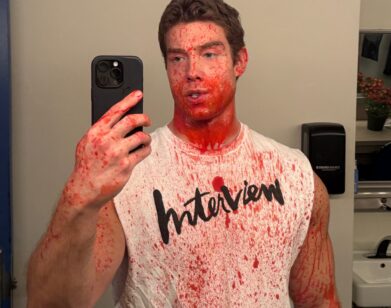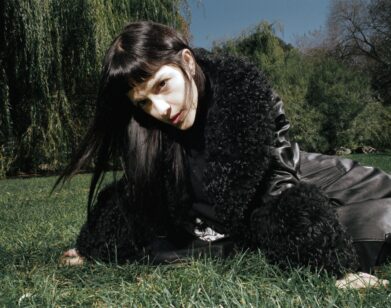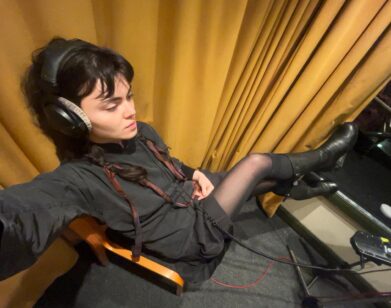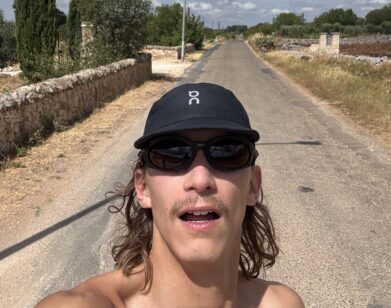HEAVYWEIGHTS
Michael Pitt and Ron Perlman on Redemption, Reinvention, and Reposado
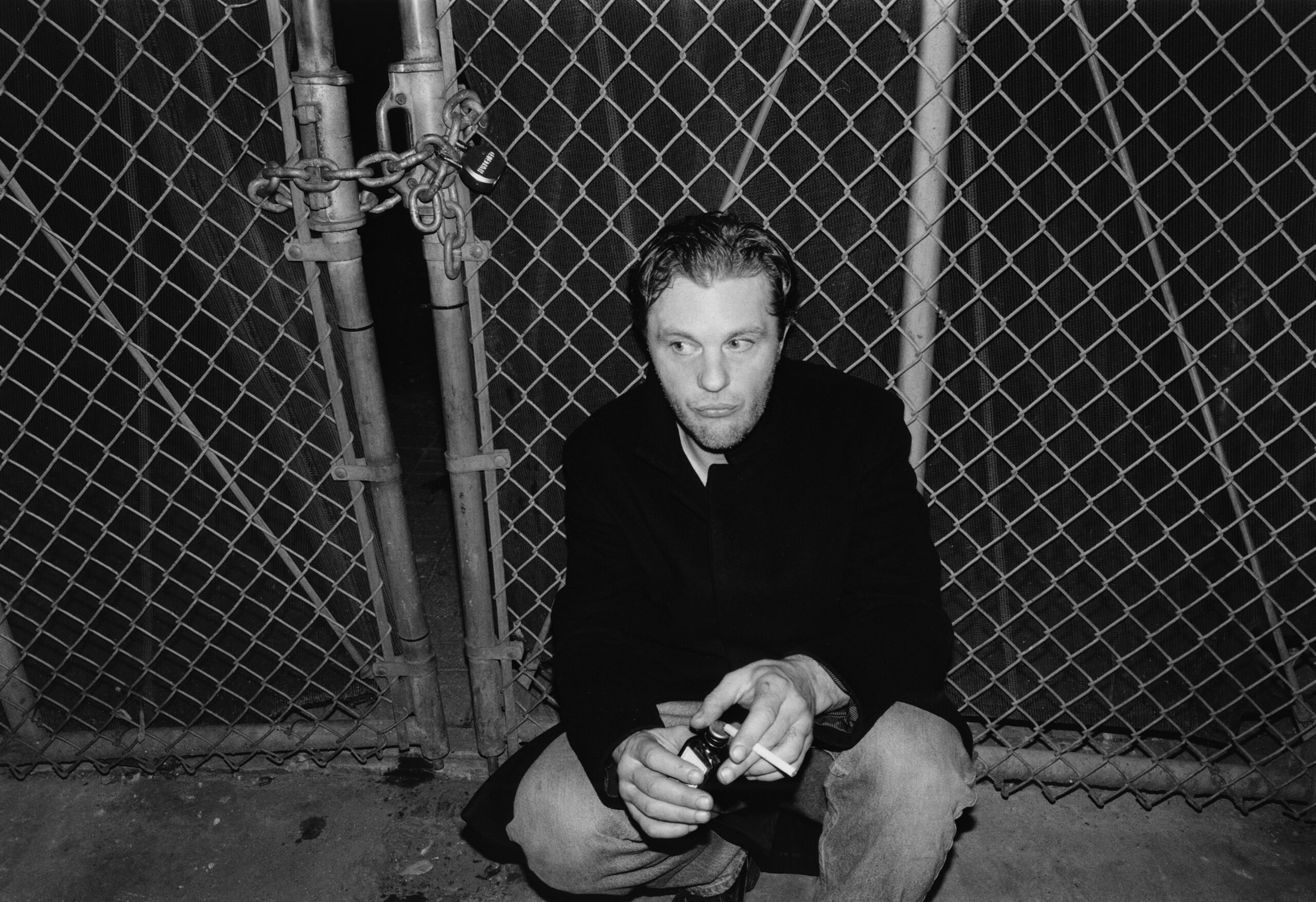
Michael Pitt, photographed by Sam Hellmann.
Over the years, Michael Pitt has become known as the poster boy for gritty, indie cinema. With performances as the cherubic and unassuming Matthew in the 2003 erotic thriller The Dreamers, and later as the psychotic sadist Paul in the blood-curdling Funny Games, the New Jersey-born actor is pretty used to disturbing plots that twist the knife. Later on, following a two season stint in Boardwalk Empire, Pitt found himself in the throes of a personal crisis that would ultimately transform his outlook and set him up for a profound personal and artistic reinvention. Returning to the screen for his first film since, he stars as “Irish” Mike Flanagan in Jack Huston’s Day Of The Fight. The morose and wrenching black and white boxing flick follows Pitt as a former middleweight champion who’s just been released from a lengthy prison sentence. Before returning to the ring, he spends the day on a redemptive voyage through Brooklyn, visiting his ex-wife (Nicolette Robinson), his estranged father (Joe Pesci), and his former trainer (Ron Perlman) to settle scores. Calling in from a tequila-drenched vacation in Cabo, his co-star Perlman asked Pitt how he geared up for his raw and uninhibited performance. In conversation, the two got to talking about rejection, fear, tequila, and the simple pleasures of saying “no.”
———
MICHAEL PITT: There you are.
RON PERLMAN: Oh yeah, look at you. You’re looking handsome. Where you at? You in your study or something?
PITT: It’s my kitchen.
PERLMAN:You got books in your kitchen?
PITT: I put my library in my kitchen.
PERLMAN: That’s novel.
PITT: Where are you?
PERLMAN: I’m in Cabo. My wife dragged me to some secluded beach here.
PITT: God bless her. She seems like an awesome woman.
PERLMAN: She’s very cool. We always come down to one of the Mexican beaches for three days right before Christmas, and she turned me into somebody who could do that. It’s a skill to turn everything off, lie on the beach, put a Piña colada on your chest and just chill.
PITT: I got to take my mother once when she was alive to Costa Rica, and I remember we were at the hotel, and she came down in sneakers with a fanny pack and 15 brochures, and she was like, “We’re going to do this and see this.” And I was like, “Ma, we’re not doing any of that.” And she’s like, “Well, what are we going to do?” And I pointed to the beach, I said, “There’s the ocean. There’s the pool, there’s the spa, there’s the bar.” It was like I needed to give her permission.
PERLMAN: It’s the hardest thing in the world.
PITT: She had never done it before. She worked 17 hours a day every day her whole life.
PERLMAN: God bless. You finally got her to chill.
PITT: Then the next day she’s 11 o’clock having a Piña colada.
PERLMAN: Right, as one should, and as I already did a couple of times today.
PITT: You’re a tequila man.
PERLMAN: I’m a tequila man. But when you’re in Cabo, you have to adapt. Sometimes you got to make a sacrifice.
PITT: What’s your favorite tequila?
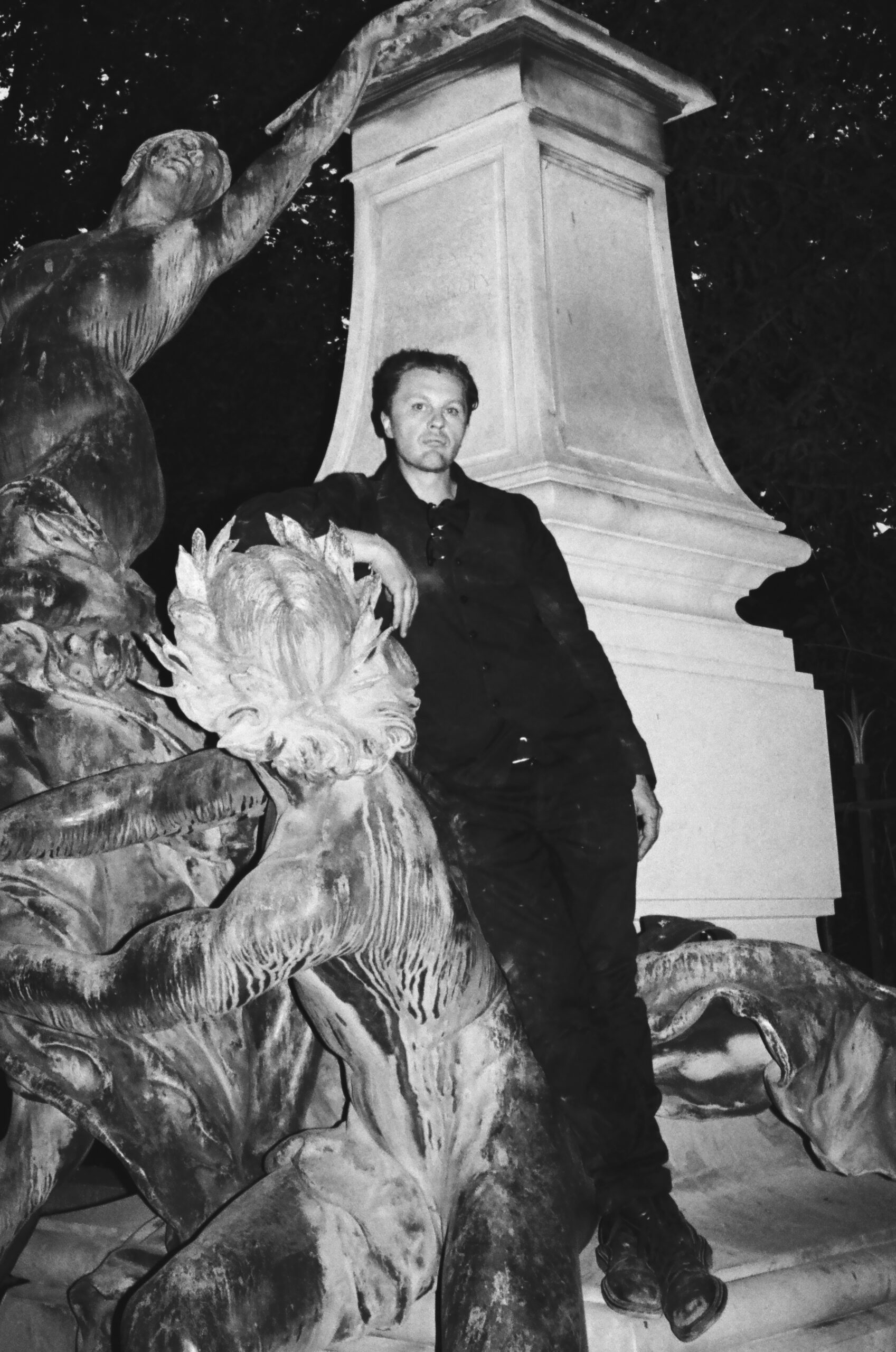
PERLMAN: I have a few that are top of my list, but one of them is called Tequila Ocho, and this particular resort has it in spades. We arrived yesterday morning and I see Tequila Ocho, so I started day-drinking. It made for a mess of a start, but I recalibrated today and I’m waiting for the sun to set before I dive back into my Charles Bukowski state of affairs.
PITT: I made a movie with a producer named Barbet Schroeder.
PERLMAN: Yes, right. He did Barfly.
PITT: He had done Barfly, and I had turned him down. I said I didn’t want to do the movie, and I hadn’t made many movies. And he was like, “Why? Listen, I made Barfly.” I was like, “I know. It’s my favorite of all your movies.” And he said, “Well, with Charles Bukowski…” And then I said I would cut off my finger if he didn’t let me do this film or something like that. So he gave me a book that Bukowski wrote called Hollywood. Did you ever read that one?
PERLMAN: No, man.
PITT: Oh, you got to. It’s about making Barfly.
PERLMAN: Wow. That is so on my list of things to do the minute we get off this call.
PITT: So I was like, “Well, I guess I got to tell him yes now.”
PERLMAN: It’s fascinating to hear when somebody is in the presence of someone, an artist who made something who really moved your needle, and yet your first instinct is to pass. What was behind that? And are you glad you ultimately did it?
PITT: Well, I was very young and very arrogant, but also I had done some theater and a play in New York. I was surrounded by great actors who took me under their wing. And when things started to open up for me after that, they told me to keep my head about things. And when I looked at all the films that the director had made, I was thinking they were more so-so, and that’s why I said no. And to be really honest, I got off on it a little bit.
PERLMAN: You got off on saying no?
PITT: A little bit.
PERLMAN: They say it’s the most powerful word in the English language.
PITT: Well, it’s the only power you have as an actor.
PERLMAN: So are you ultimately glad you said yes?
PITT: I do believe it was good that I did it. I think it’s good to be selective, but I also came from a place where actors should be working. You need to work.
PERLMAN: Yeah, I was hanging out with a very good friend of mine who I won’t name. He’s one of these actors that actually is hot enough that he can get a movie financed.
PITT: I like that.
PERLMAN: And he used the word “curate,” and it was so striking. He’s curating a career. It has so little to do with responding to material and so much to do with, “Should I? Will this? If I do this, will it?” It’s like it really fucking started to needle me, this use of word. But having been a part of your life in the creation of this movie Day of the Fight, dude, you really got under my skin in the best of all possible ways that one artist can.
PITT: Well, that feeling is mutual.
PERLMAN: Which leads me to my very first question, which is–
PITT: Do you mind if I smoke?
PERLMAN: I’m going to light so you’re not smoking alone in a second.
PITT: The only interview I can smoke in.
PERLMAN: You can.
PITT: Don’t smoke, kids.
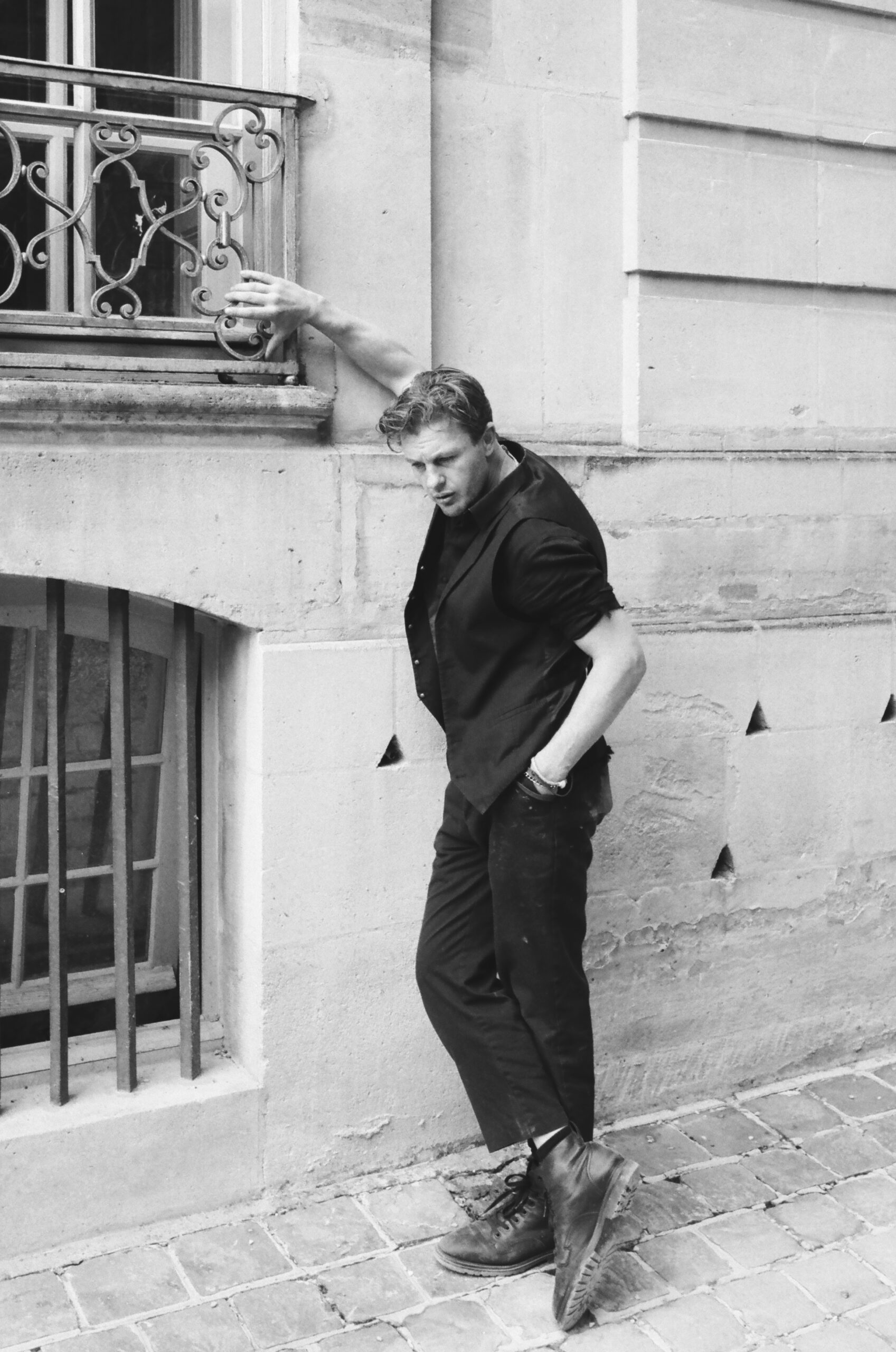
PERLMAN: Well, when we are doing this effectively and properly, we give the impression to the audience that the character that we’re looking at actually exists in the world. I go out of my house now expecting to run into “Irish” Mike because you’ve made him into a human being with all of the slings and arrows of humanity: longing, doubt, love, self-discrimination. So when you began to develop a sense of what Jack was going to be asking of you, did you approach this any differently than you would any other character you’ve ever done?
PITT: I mean, yes and no. I try to approach every role trying to top what I did last, and I’ve learned that that makes people very intimidated. So there are times where maybe I soften that on purpose so that they don’t call me difficult or something. But Jack [Huston] wanted me to fight. He wanted me to bear my soul. And I do think that “Irish” Mike is a creation of Jack Huston’s writings, from his mind, but I think that there’s probably thousands of “Irish” Mikes all over the world, and if I could give them some inspiration—I guess that’s how I approached it. I also was pretty down to the ground at that moment in my life, and Jack believed in me when it seemed like no one else did. So that was different from other roles, maybe more spiritual. All I cared about was him being happy with fighting for me, and I mean that.
PERLMAN: You know how happy he is, right?
PITT: Yeah.
PERLMAN: He’s really fucking happy. But this character, “Irish” Mike Flanagan, is so raw, and he goes to so many places of sadness and longing. Was there ever a moment where you said to yourself, “Holy shit, I’m not sure I can get there”?
PITT: Yes, all the time, every second of the day. I remember my mentor would say, “You should be worried when you’re not nervous.” Being not nervous means you’re not reaching far enough, you’re falling back on what you know. Also, what’s great about this film is the fight metaphor, where anything can happen, and those doubts can give you discipline and strength.
PERLMAN: I marveled at the vulnerability and at how brave you were while the camera was rolling, which is to be unsure and lay yourself at the feet of the characters, your ex-wife, your dad, the relationship you had with Buscemi, the relationship you had with me, you wanted everybody to know what they meant to you. And that’s like the 12-step program on steroids, laying yourself at their feet and hoping for two things: recognition and mercy. And it’s all over the screen.
PITT: Well, I think what I’ve realized working in this business is that I come in contact with this sometimes, but not all the time. I was so outcast as a young child in every faction of my life that it actually freed me. I was so young that they just put the stigma on me at a very young age and in so many different ways.
PERLMAN: I mean, we’re watching a release. I don’t want to give too much about the movie away, but there is so much at stake for this character to communicate these very primal feelings to those few people he loves, that it’s a relief to be able to do it, which is what you’re saying. Getting a role like this is a gift because it gives you an opportunity to find a release in all of that rejection and that awkwardness.
PITT: Yes, absolutely. But also, everyone’s just afraid of being rejected. You know what I mean?
PERLMAN: Right. You were wearing headphones in most of the pictures, right? Especially when you’re going from place to place, so it’s all that transitional stuff. Were you actually listening to music?

PITT: I would like to say that I was. No, I wasn’t.
PERLMAN: Okay.
PITT: I wasn’t listening to music, but I’m a musician. I’ve noticed that some actors will listen to pieces of music and it will put them in a state before they do a scene or something, but I don’t do that. I think partly because I start thinking too technically about the music. But Jack is definitely an actor and a director that uses music, and it was such a big inspiration. When I would go home after shooting, I was listening to a lot of The Pogues and a lot of Tom Waits. I would listen to some Captain Beefheart, just kind of folky, grungy storytelling.
PERLMAN: Right. All those songs would be very evocative of “Irish” Mike’s state of mind. And whether you’re listening to it while the camera’s rolling when you have those AirPods in or you’re doing it when you go home, it’s still permeating the person you need to be in the midst of that 20-day shoot. Were there scenes that you were terrified of that you wished you didn’t have to play, that you were shitting your pants?
PITT: Well, I was shitting my pants pretty much every day, but I think that’s good and healthy. I mean, I think that you should be if you like the work. I would be nervous if I wasn’t nervous because I should be nervous. It will make me go home, think about it more, run it more times. Yeah, Pesci—I mean, he’s dark. And people say that about me, but even I’m like, “Whoa.”
PERLMAN: “You think I’m dark? You should see Pesci.”
PITT: Before I’ve even shook his hand he said three sentences. I thought, “Oh my god, what a life.”
PERLMAN: I heard about that very brief exchange that happened as you were getting ready to shoot that scene on the second day of filming. That’s not the kind of scene that you want before you’ve had a chance to just totally get your legs under you.
PITT: Thank you for saying that. You’re an actor, so that means a lot.
PERLMAN: I heard about how, as you were getting ready to shoot that scene, you had a couple of little minor exchanges with Joe Pesci, all of which were very un-minor.
PITT: What do you want to hear?
PERLMAN: I would like for you to spill your beans about Joe Pesci, for once and for all.
PITT: Okay. I went up to his very fancy hotel room, right by Columbus Circle. He had a baby grand piano in the main room. And I had just broken my pinky finger and I hadn’t had a doctor look at it yet, and so all I had was a giant bag of ice. So I was trying to hide it behind my coat jacket and I spilled the ice all over the beautiful couch. Jay was like, “What the fuck are you doing?” I was like, “I’m sorry.” Because it all started to melt. He said, “Well, clean it up.” So, I’m on my hands and knees in this hotel room, picking up the ice cubes. He finally comes down, pours two martinis, and he just started talking to me a bit about his life. We had some things in common. We both grew up in Jersey. My grandfather had Italian restaurants in New Jersey, and I thought that we would connect on these things. But with everything, there was just a bad story attached to it. “Don’t talk to me about Jersey. Don’t talk to me about Marty.” So I was looking around the room and I saw under the baby grand he had this beautiful vintage Martin guitar, and 0ut of desperation of not knowing what to do I was like, “Hey, you think I could try that guitar out?” And he said, “That piece of shit? Sure.” And so, I picked up the guitar and I was like, “Oh my god, this thing is amazing.”
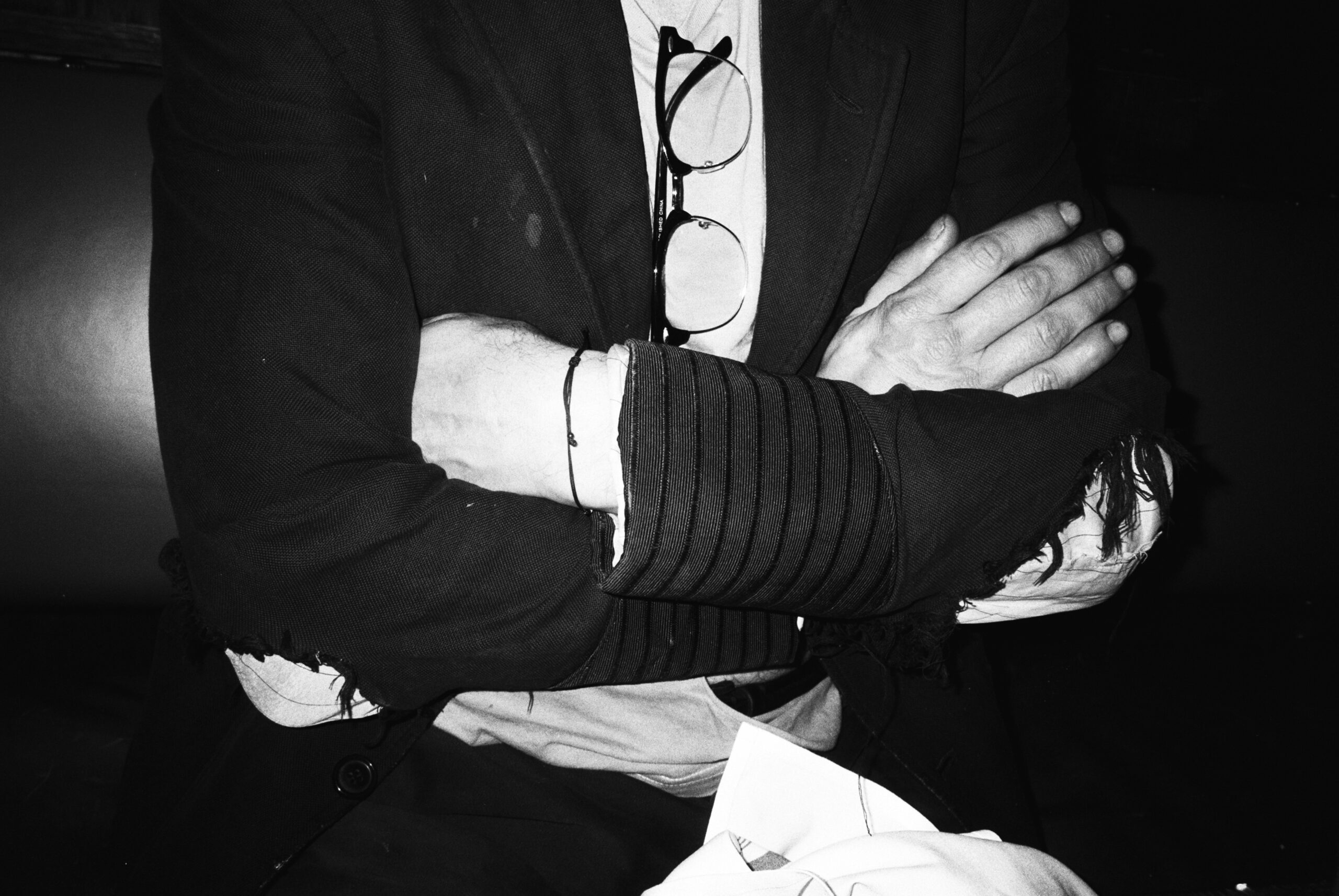
PERLMAN: That’s the Stradivarius of guitars.
PITT: And I said, “Can I play you a song?” So, I’m sitting on his couch and I turn to him and he’s like, “Play me one.” And after I played him a song he was like, “That was pretty good.” And then he grabbed the guitar, and then he played me a song, then I played him a song, then he played me another.
PERLMAN: Wow.
PITT: And it was the connection that I was looking for, that one would hope for when you’re working with someone. It’s so strange to me that, of all people, it would happen like that with Joe Pesci. And then shooting was intense, and I wasn’t sure whether or not he was going to speak, whether he would utter something, or how far he was gone. It was always open that he might speak.
PERLMAN: If the spirit moved him.
PITT: Right. So then I was like, “Oh, no problem. I’ll just go in there and piss him off. I’ll do things that bother him and then he’ll have to speak.” So I walked around the room, I tried to yell at him, I tried to get soft with him, I tried all these things and then I realized, “Oh, no, no, no, that’s his choice.” And then I got really nervous. And I think we had maybe one hour left, and it was the monologue, and we talked a little bit and it seemed like we were on the same page about it. What was really important to me was that nothing was two-dimensional. In other words, the abusive father was not just the abusive father. The issue with his wife, the issue with his daughter, whenever we see these things, whenever I roll my eyes, is when you see good guys and bad guys. But when you’re a younger actor and there’s an actor who’s maybe got some years on you, you’re looking for a few words of encouragement, you know?
PERLMAN: Mm-hmm.
PITT: And all he said to me was, “Don’t fuck this up.” Which I thought was good advice.
PERLMAN: I’ve been given that advice. Well, I think we covered pretty much everything I had in my mind.
PITT: You’re the best, Ron. Thank you so much for doing this, man.
PERLMAN: Big hug, brother.

